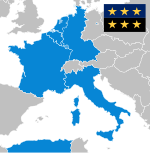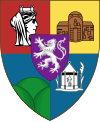Portal:European Union
Introduction
The European Union (EU) is a supranational political and economic union of 27 member states that are located primarily in Europe. The Union has a total area of 4,233,255 km2 (1,634,469 sq mi) and an estimated total population of over 448 million. The EU has often been described as a sui generis political entity (without precedent or comparison) combining the characteristics of both a federation and a confederation. Containing 5.8% of the world population in 2020, EU member states generated a nominal gross domestic product (GDP) of around US$16.6 trillion in 2022, constituting approximately one sixth of global nominal GDP. Additionally, all EU states except Bulgaria have a very high Human Development Index according to the United Nations Development Programme. Its cornerstone, the Customs Union, paved the way to establishing an internal single market based on standardised legal framework and legislation that applies in all member states in those matters, and only those matters, where the states have agreed to act as one. EU policies aim to ensure the free movement of people, goods, services and capital within the internal market; enact legislation in justice and home affairs; and maintain common policies on trade, agriculture, fisheries and regional development. Passport controls have been abolished for travel within the Schengen Area. The eurozone is a group composed of the 20 EU member states that have fully implemented the economic and monetary union and use the euro currency. Through the Common Foreign and Security Policy, the union has developed a role in external relations and defence. It maintains permanent diplomatic missions throughout the world and represents itself at the United Nations, the World Trade Organization, the G7 and the G20. Due to its global influence, the European Union has been described by some scholars as an emerging superpower. In 2012, the EU was awarded the Nobel Peace Prize. The United Kingdom became the only member state to leave the EU, in 2020; ten countries are aspiring or negotiating to join it. (Full article...) Selected article The ECSC was first proposed by French foreign minister Robert Schuman on 9 May 1950 as a way to prevent further war between France and Germany. He declared his aim was to 'make war not only unthinkable but materially impossible.' The means to do so, Europe's first supranational Community, was formally established in 1951 by the Treaty of Paris, signed not only by France and West Germany, but also by Italy and the three Benelux states: Belgium, Luxembourg and the Netherlands. Between these states the ECSC would create a common market for coal and steel. The ECSC was governed by a 'High Authority', checked by bodies representing governments, MPs and an independent judiciary. The ECSC was joined by two other similar communities in 1957, with whom it shared its membership and some institutions. In 1969 all its institutions were merged with that of the European Economic Community (EEC, which later became part of the European Union), but it retained its own independent identity. However in 2002 the Treaty of Paris expired, and with no desire to renew the treaty, all the ECSC activities and resources were absorbed by the European Community. During its existence, the ECSC had succeeded in creating a common market but could not prevent the decline of the coal and steel industries. It did however set the ground for the future European Union. Selected pictureBanknote design credit: Kingdom of Prussia; scanned by Andrew Shiva
Did you know?...that France possesses the largest exclusive economic zone (EEZ) in the world? ...that Monaco, San Marino, and Vatican City all mint their own euro coins, with their own national symbols on the back? ...that Turkey's two most famous weightlifters, Naim Suleymanoglu and Halil Mutlu are only two of four weightlifters in the world to have won 3 gold medals in 3 olympics? Selected citySofia is the capital and largest city of the Republic of Bulgaria, with a population of 1,246,791, and some 1,377,761 in the metropolitan area, the Capital Municipality. It is located in western Bulgaria, at the foot of the mountain massif Vitosha, and is the administrative, cultural, and economic centre of the country. The history of Sofia dates back to the 8th century B.C, when Thracians established a settlement there. Sofia has had several names in the different periods of its existence, and remnants of the city's millenary history can still be seen today alongside modern landmarks. Sofia is one of the oldest capital cities in Europe, blending its past and present in a remarkable architectural style. Historic landmarks include the 10th-century Boyana Church, the Alexander Nevski Cathedral, and the early Byzantine Saint Sofia Church. More modern architecture is represented by the Bulgarian National Opera and Ballet, the Ivan Vazov National Theatre, the Rakovski Str theatre district, Slaveykov Square's outdoor book market, and the NDK. Sofia is the see of an Eastern Orthodox and of a Roman Catholic diocese. General imagesThe following are images from various European Union-related articles on Wikipedia.
TopicsFeatured contentFeatured articles
Featured lists
Featured contentGood articles
CategoriesRelated portalsAssociated WikimediaThe following Wikimedia Foundation sister projects provide more on this subject:
Discover Wikipedia using portals |


































































